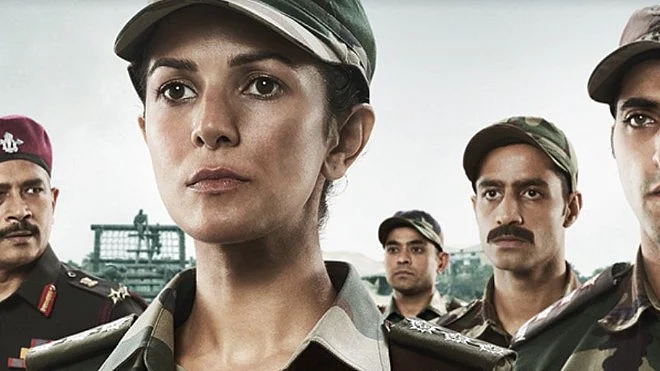If you were to make a man out of a boy, what would you make out of a woman?
She is born a woman.
Her gender is strapped to her body with jagged labels and her crib is decked with pink finery. Warpaint in place and gender in tow, she is battle-ready.
‘’Why do balls represent strength? They are the weakest part of a man’s body,” exclaims a seasoned Captain Shikha Sharma while seated in the Indian Army Special Forces Canteen with her fellow male officers.
Therein starts the feisty Captain’s “vagina monologue(s) ”. Gradually, her monologues do not prove to be soliloquies at all – she gets the men to not just participate perfunctorily, but also begin to see her in a new light.
As the first female officer inducted in a combat role, Sharma, played by Nimrat Kaur, goes on to take her churiya-pehenke-baitho detractors by the scruff of the neck and prove to them that “desh-bhakti gender dekh ke toh nahin aati”. These are the same people who claim they’re all for “equality’’ but when it comes to accepting Sharma as a fellow soldier, they fail miserably.
Nagesh Kukunoor and Vinay Waikul’s The Test Case will drag such slacktivists out from their armchairs and make them face their gods in the battlefield. Probably with just their underpants on.
Because it strips you bare. It haunts you with nightmares as chilling as those of Sharma’s, when she is sexually assaulted during a training exercise. The Test Case is not another feminist show that merely questions age-old stereotypes. It goes beyond objective determinants and questions ideological desires. How “convenient’’ is your feminism? Does it apply itself subject to terms and conditions?
“She is so strong... for a woman.”
“She’s really got it in her... for a woman.”
If you are peppering your sentences with the common latter-half, we’ve got a problem.
Sharma is made to go through hell. She is branded with ‘special privilege’ stamps, even though she specifically asks for none. She is flecked with unsolicited opinions right from the start. She is told that “Special Forces is not a... picnic” because her physical strength cannot possibly match up to that of a man.
Despite where we’ve gotten, there is something extraordinarily poignant about the way Sharma’s mother peps her up right before she is about to leave for the course. With a tight yet tender smile on her face, she asks her daughter to be careful and warns her, “Chhoriya badal rahe hain, chhore nahin...’’ (‘Women are changing...men aren’t’) and that men don’t usually like it when women get ahead of them.
Throughout the 10 episodes, Sharma is not easy to take down. She fights when she falters during training exercises, she fights when she walks in to take a shower in the same area as her male colleagues, she fights when she is sexually assaulted by a disgruntled team member and she fights when she is told, “You can’t...’’
The plotline keeps you hooked and the logistical details mostly deliver, except perhaps RMO Aparna’s manicured nails or the slightest tinge of mascara on Captain Sharma.
At one point, towards the end, Sharma hurls “bh*nchod” at her assaulter when she confronts him. I couldn’t help but wish she had hurled a gender-neutral gaali, after everything the show manages to achieve.
Also, The Test Case is uncannily similar to the 1997 film G. I. Jane. In it, Demi Moore fights to prove herself as the first female officer in the US Navy Special Warfare Group. She has been hand-picked by a female Senator. Though the premise is the same, The Test Case differs when it comes to details. Kaur is sexually assaulted in a blood-curdling scene while Demi Moore faces charges of fraternising with women. Moore is also framed by the very Senator who'd picked her, while Kaur is wholeheartedly supported by the Defence Minister, played by Juhi Chawla. The sordid shadow of sexual assault and the consequences of a 'woman-in-a-man's-world' lurks in both narratives.
Most importantly though, The Test Case clearly manages to raise an important question:
When a woman steps into what is traditionally considered a man’s territory, and she is taken advantage of, how does she fight back? Should the resistance be formulaic or should she fight back her own way? Should Sharma have reported her assaulter right away, or was she right to have refused to report and instead take her own brand of revenge the way she did?
Nimrat Kaur is a delight to watch. She is a one-woman army and her performance is spine-chilling even when she is marching to kitschy tunes like, “Rag rag mein India...’’.
Watch The Test Case because it tells you, in the most effective manner possible, that battles are to be fought together by both sexes, not between the two.
(At The Quint, we question everything. Play an active role in shaping our journalism by becoming a member today.)
